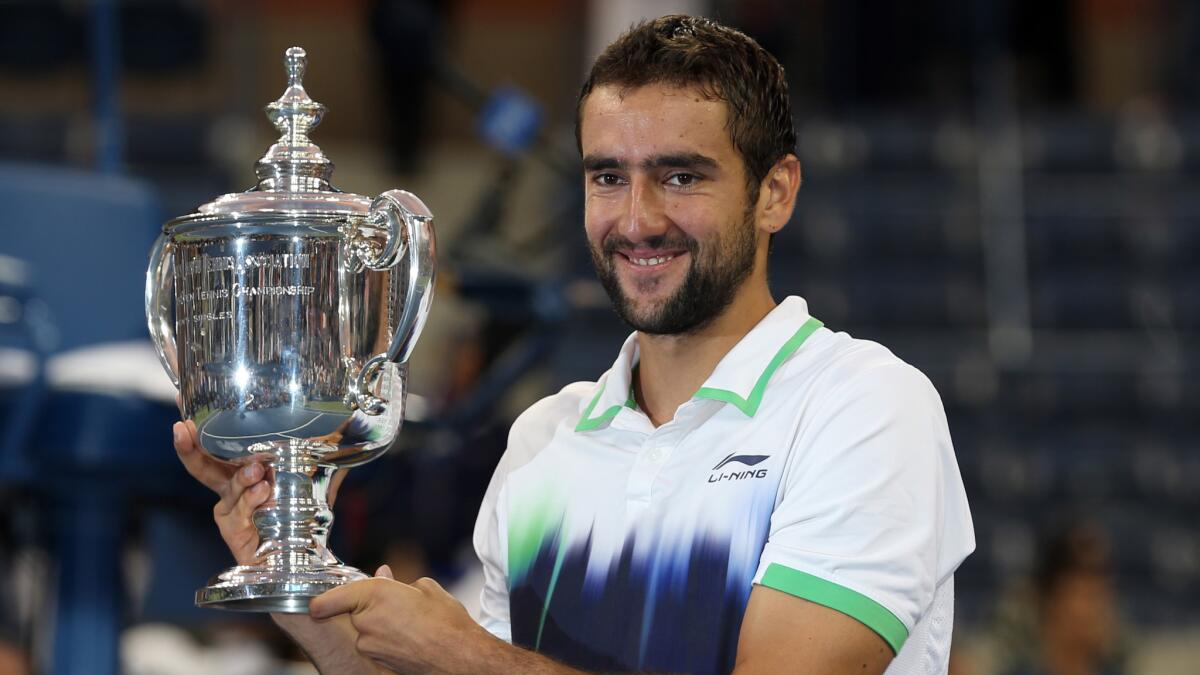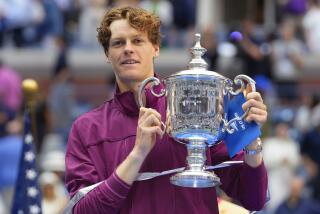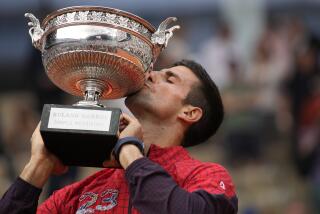Column: Marin Cilic overpowers Kei Nishikori in U.S. Open tennis final

- Share via
From New York — The summary of Monday’s singles final at the U.S. Open in the Big Apple was as simple as the final score: Big man. Big game. Big win.
The summary of many who watched, especially those not deeply into the sport and expecting great drama from this country’s major tennis showcase was simple, too: Big bore.
Almost as quickly as you can say 6-3, 6-3, 6-3, Marin Cilic of Croatia had his first Grand Slam event title.
His opponent, Kei Nishikori of Japan, was the crowd favorite in mostly filled Arthur Ashe Stadium. Despite the adrenaline push from that, he had little chance.
Cilic is 6 feet 6 and 200 pounds, Nishikori 5-10 and 150. Not a fair fight. George Foreman against Manny Pacquiao.
Statistics often lie, especially in tennis. Not this time. Cilic, serving consistently in the 120-to-135-mph range, hit 17 aces. He also blasted accurately from the baseline, hitting 38 winners and taking match point with a cross-court backhand exclamation point. Nishikori had two aces and 19 winners.
After Shocker Semifinal Saturday here, when Nishikori eliminated No. 1 Novak Djokovic and Cilic did the same to No. 2 Roger Federer, most of the so-called experts who broadcast and type theorized that Cilic would serve Nishikori off the court.
That he did.
It was the first tennis major for a Croatian man since the tour’s former delightful goof, Goran Ivanisevic, won the Wimbledon title in 2001. Sitting in Cilic’s box this week, in the coaching chair, was none other than Ivanisevic, who received much credit from Cilic afterward.
“He showed me the joy of the game,” Cilic said. “He gave me belief that I can play aggressively over three sets, five sets. The joy he showed me made me more relaxed.”
Those who covered Ivanisevic in his playing days could easily understand how he loosened up his pupil. Ivanisevic was a talented player, with a massive serve and a game that worked best on the grass at Wimbledon. He could also be a laugh a minute, even when he wasn’t trying.
Years ago, after yet another early and unexpected departure from the U.S. Open, Ivanisevic explained to the media that it just wasn’t meant to be here, that everytime he was playing and a plane from LaGuardia flew overhead, “I could see my seat on it.”
He once told reporters at Indian Wells that he was too unsettled to play well in the desert, because there were so many old people there and when he went out to dinner, he feared that somebody would go face down in their food and die.
When he returned to Croatia after his Wimbledon title, he was greeted by 250,000 people. He stripped off all his clothes and jumped into the sea.
A once stiff and unsure player could easily be made more loosey-goosey just by being around Ivanisevic. Ivanisevic always went for it. You just weren’t sure exactly what it was he was going for.
There were several moments of potential tightening in this match for Cilic, whose previous best inroads at a major was the semifinals of the 2010 Australian Open.
He got his first service break when Nishikori sliced a forehand wide and Cilic led, 4-2. Consolidating that break was crucial. First Grand Slam event final. First break. Nerves jangle.
But Cilic cracked a cross-court forehand winner to 40-15 and then hit a lightning-bolt 130-mph serve that Nishikori just ticked with his racket. The truth was, Nishikori’s fast hands deprived Cilic of half a dozen more aces.
Cilic served two aces in his first service game of the second set, then broke in the next game when Nishikori saved three break points but couldn’t save a fourth. In the sixth game of the set, Cilic won with, in order, a 129-mph service winner, and three aces — 121, 122, 129.
By then, Nishikori must have felt like the last guy left in a dodgeball game.
Cilic started the third set with aces of 128, 122, 125 and finished it, after Nishikori got it back to deuce, with a 120 bomb.
All that mattered after that was whether Cilic could hold his nerves and his serves. Nishikori kept fighting but said he couldn’t fight on for one more match, alluding to the two four-hour-plus five-setters he won enroute to his four-setter over Djokovic.
Cilic kept holding serve.
Soon, 1 hour 54 minutes after his tennis bombardment had begun, he was collapsing on his back in joy and then climbing into his friends’ box to hug everybody, starting with Ivanisevic.
His joy was certainly enhanced by the fact that he was not even allowed to play here last year. He was at home in Croatia, sitting out a drug positive, a stimulant that he said he took inadvertently. Tennis officials eventually agreed with his innocence of intent and reduced the suspension from nine months to four.
While Arthur Ashe Stadium was full for the match, it is unlikely that this one sent waves of excitement across America. With Federer and Djokovic getting all the way to the semifinals, anticipation had built. With both losing to players with little name identification for the general sports audience, this men’s final probably laid an egg in general interest and TV ratings.
Cilic could not care less.
“It seems completely unreal,” he said, “to be called a Grand Slam champion.”
His huge smile hadn’t left since the moment he beat Federer and was still there at his news conference Monday.
But then, it was hard to track the real source of that: Was it the joy of a Grand Slam event title? Was it the $3 million he won?
Or was it something funny or weird that Ivanisevic had just done. Again.
More to Read
Go beyond the scoreboard
Get the latest on L.A.'s teams in the daily Sports Report newsletter.
You may occasionally receive promotional content from the Los Angeles Times.











